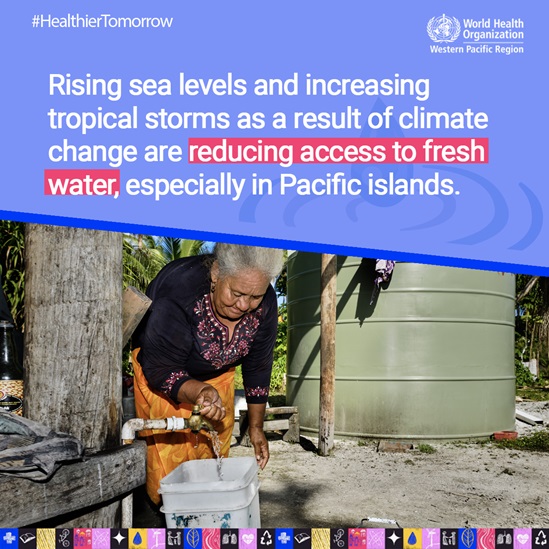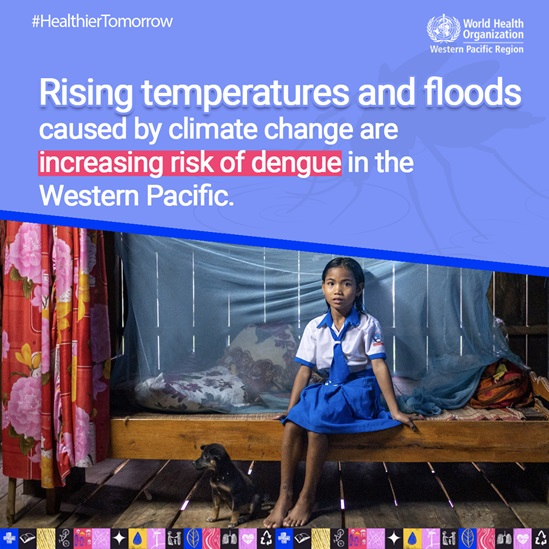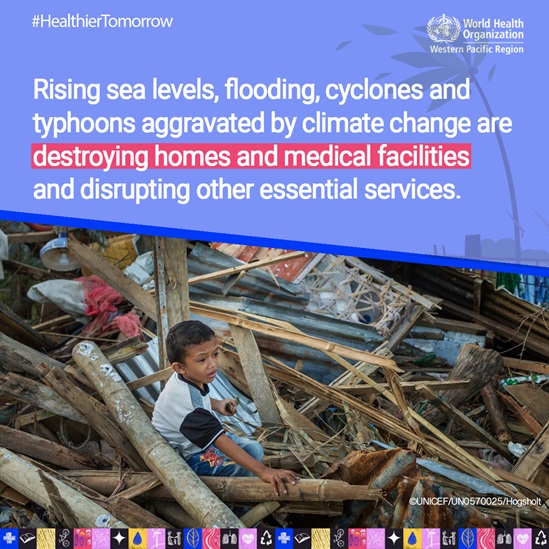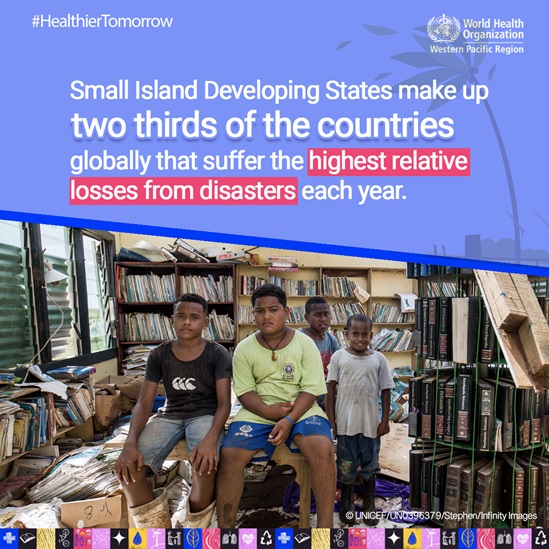
Advocacy tools for the public
Elesi, Salome, Cecelia and Loata collects mosquito larvae during the World Mosquito Day event in Suva, Fiji as part of an awareness exercise about mosquito breeding sites.
Want to join WHO in advocating for the climate and environmental action that will lead to better health? Here are some graphics you can share on your social media.
Downloadable graphics
Social media messages to share
If we all ate mostly plants, we would be healthier, greenhouse gases associated with meat production would be reduced, and our ecosystems would benefit.
Eating a greater proportion of plant-based foods such as vegetables, wholegrains, fruit, and legumes provides a degree of protection against noncommunicable diseases (like type 2 diabetes or cancer) and is linked with a lower risk of dying early.
Meat production results in substantial greenhouse gas emissions while eating too much meat has numerous health risks, placing a burden on healthcare systems.
Raising farm animals such as cows, pigs and chickens generates 14 percent of all carbon emissions, similar to the amount generated by all transport put together (1).
It was estimated that 2.4 million deaths worldwide in 2020, and approximately €240 million in healthcare costs were due to excessive red and processed meat consumption (2).
TIP! Start by increasing the proportion of your plate filled with locally grown vegetables, wholegrains, and legumes.Up to 5 million deaths a year could be averted if the global population was more active.
Taking the stairs rather than the elevator or lift is a great way to be physically active while reducing electricity use. This is especially important in countries where electricity comes from the burning of fossil fuels.
Physical activity has major health benefits. Physical activity reduces the risk of many chronic health conditions such as obesity and strokes while improving mental health and wellbeing.
TIP! Start by routinely taking the stairs down one or two floors and build from there as your strength and fitness improves.
Cycling rather than driving a car powered by fossil fuels can reduce harmful emissions 30-fold per trip while dramatically improving physical fitness (3).
Transportation is responsible for 24% of the CO2 emissions from fuel combustion.
TIP! Start with small trips to the local shop and increase your distance as your fitness improves.Over 90% of people breathe unhealthy levels of outdoor air pollution, largely resulting from the burning of the same fossil fuels that are driving climate change.
Air pollution leads people to be exposed to fine particles in polluted air that penetrate deep into the lungs and cardiovascular system, causing diseases including stroke, heart disease, lung cancer, chronic obstructive pulmonary diseases and respiratory infections.
Climate change is “the single biggest health threat facing humanity”.
As climate change disrupts weather patterns, water will become scarcer and will be more likely to be contaminated.
Already, more than 14 000 people in the Western Pacific Region die each year from diarrhoea due to unsafe drinking-water, inadequate sanitation, and poor hygiene.
Rising temperatures and floods caused by climate change are increasing the risk of dengue in the Western Pacific Region.
The mosquitoes that carry the dengue virus are climate-sensitive, meaning that they prefer to live in certain weather conditions. As the climate changes, so does the distribution of these disease-carrying mosquitoes, with dengue cases being increasingly found in places they were rarely or never seen before.
In Pacific island countries and areas, climate change threatens lives and livelihoods, fragile health-care facilities – which are often located in coastal or low-lying areas – and, ultimately, some countries’ very existence.
Health systems are the main line of defence against climate-related shocks and stressors, including increases in mosquito-borne and water-borne diseases, and food insecurity.
Without action to build the resilience of health facilities to withstand climate shocks, the impacts of climate change are expected to further strain health services and to disproportionately impact the most vulnerable people.
Already, 3.5 million people in the Western Pacific Region lose their lives each year due to avoidable environmental causes like air pollution, extreme weather events or water-borne diseases.
In the years to come, the health impacts of climate and environmental change will increase.
Climate-sensitive diseases like dengue and leptospirosis will spread, it will become more difficult to grow healthy food, drinking water will become scarce or contaminated, people will suffer from living and working in higher temperatures, and climate-fuelled super storms will cause illness and injuries.
Small island developing states make up two thirds of the countries globally that suffer the highest relative losses from disasters each year (4).
Pacific island countries and areas are on the front line of climate change and are among the planet’s most vulnerable to extreme weather events and the cascade of effects resulting from climate change.
Rising sea levels continue to erode low-lying islands and atolls, destroying homes and livelihoods that have existed for centuries.
Serious health impacts caused by climate change include mortality and morbidity caused by extreme weather events; heat stress; waterborne and foodborne diseases; malnutrition; and adverse psychosocial impacts from people being displaced from their homes as well as loss of culture and valued ecosystems.
- Food and Agriculture Organization of the United Nations, Tackling climate change through livestock – a global assessment of emissions and mitigation opportunities, 2013.
- Springmann M, Mason-D’Croz D, Robinson S, Wiebe K, Godfray HCJ, Rayner M, et al. (2018) Health-motivated taxes on red and processed meat: A modelling study on optimal tax levels and associated health impacts. PLoS ONE 13(11): e0204139.
- Brand C, et al. The climate change mitigation effects of daily active travel in cities. Transportation Research Part D. Transport and Environment. 2021; 93, 102764. doi: https://doi.org/10.1016/j.trd.2021.102764
- OECD. Small Island Developing States - SIDS


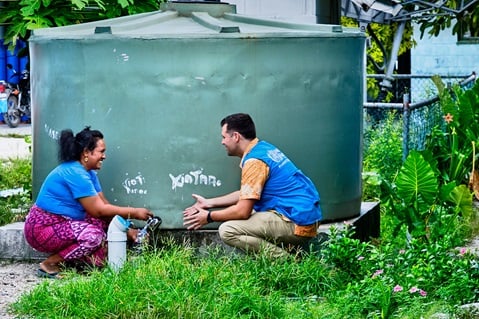
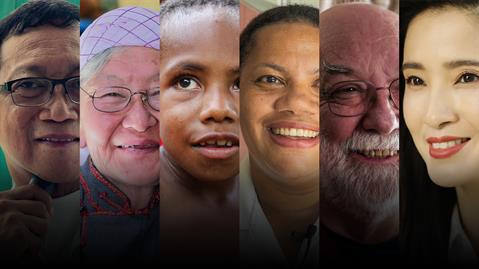
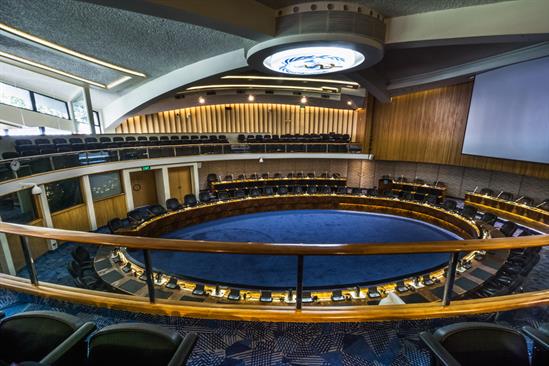
/eat-a-more-plant-based-diet.tmb-549v.jpg?Culture=en&sfvrsn=71a4c90c_1)
/take-the-stairs.tmb-549v.jpg?Culture=en&sfvrsn=b5330841_1)
/ride-a-bike.tmb-549v.jpg?Culture=en&sfvrsn=911cf909_1)

